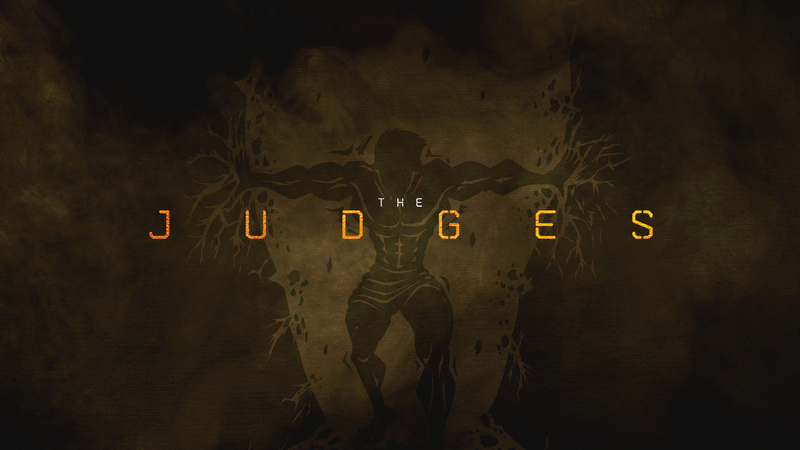
Judges
Week 7 — The God Who Raises Deliverers
-
The ___________ of sin and grace.
20 So the anger of the Lord burned against Israel. He said, “Because this nation [גּוֹי (gôy)] has violated my covenant, which I commanded to their fathers, and because they did not obey my voice, 21 I will no longer drive out from among them a single one of the nations [גּוֹי (gôy)] that Joshua left unconquered when he died. 22 I will do this in order to test Israel by means of them. Will Israel keep the way of the Lord and walk upon it as their fathers kept it, or not?” (Jdg 2:20–22)
Othniel: God’s _________________________________ deliverer.
7 Then the people of Israel did evil in the eyes of the Lord. They forgot [שָׁכַח (šā·ḵǎḥ)] the Lord their God and served the Baals and the Asherahs. 8 The anger of the Lord burned against Israel, and he sold them into the hand of Cushan Rishathaim, who was the king of Aram Naharaim. The Israelites served Cushan Rishathaim for eight years. 9 Then the people of Israel cried out to the Lord, and the Lord raised up a deliverer for the Israelites, who saved them. The deliverer was Othniel, son of Kenaz, the youngest brother of Caleb. (Jdg 3:7–9)
Remember [זָכַר (zā·ḵǎr)], O Lord, your compassion and your mercy, for they are from eternity. (Ps 25:6)
Do not be angry, Lord, without limit. Do not remember[זָכַר (zā·ḵǎr)] our guilt forever. Please look closely. All of us are your people. (Is 64:9)
Tim Keller: When God is asked: "Remember…" he is being asked to act according to his character. When someone asks God to "remember not …" he or she is asking that God would not act on what he knows. Therefore, to say that the Israelites "forgot" God is to say that they no longer were controlled by what they knew. We could put it another way. Though they knew who God was and what he wanted, those things were not real to them. … So, the reason that the Israelites (like all of us) continually needed revival was because truths about God which were once vibrant and real to them eventually became unreal. Our hearts are like a bucket of water on a very cold day—they will freeze over unless we regularly smash the ice that is forming. Though we know truths about God, we can very easily lose the sense upon our hearts of their reality. We know them, but we don't "taste" or "see" or "feel" them. Therefore, other things—Idols—become more real to our hearts, and we serve them instead.
10 The Spirit of the Lord was upon him. He served as Israel’s judge. When he went out to wage war, the Lord gave Cushan Rishathaim, the king of Aram, into his hand, and his hand was strong against Cushan Rishathaim. 11 Then the land was quiet for forty years, and Othniel son of Kenaz died. (Jdg 3:10–11)
In the ___________ sense, sanctification is everything that has do with a _________ life, from its _________________ at conversion up to the hour of _________ and the Christian’s _________________ from the church on earth to the church in heaven.
In the _____________ sense, sanctification is the Christian _________ that one ___________ as a _____________ of conversion, as a ___________ of faith.
In sanctification in the ___________ sense, there is _____ cooperation, it is _______ God’s work. In sanctification in the _____________ sense, there is a _______________ cooperation between God and the Christian.
Then Caleb quieted the people before Moses and said, “We should go up now and take possession of it, because we can certainly conquer it!” (Nu 13:30)
God made him who had no sin to be sin for us, so that in him we might become the righteousness of God. (2 Co 5:21, NIV1984)
Points to Ponder
- What is one thing that stood out for you from this week’s message?
- What patterns do you notice in Israel’s behavior in verses 7–11? (How do they move from sin → suffering → salvation → peace → sin again?)
- What does it mean that “the Israelites forgot the LORD their God” (v.7)? How might “forgetting God” look in our lives today?
- How is God’s response to Israel’s sin both just and merciful in this passage?
- What stands out to you about Othniel’s role as a deliverer? (See also Judges 1:11–15 for background on him.)
- Verse 10 says, “The Spirit of the LORD was upon him.” What difference does God’s Spirit make in Othniel’s leadership and victory?
- Why do you think the story ends with a time of peace? What does that peace teach us about God’s grace and faithfulness?
Read: Judges 3


